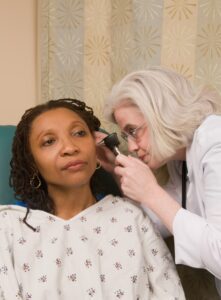Page Contents
In my last blog article, we shared about eye screening as part of the functional screenings. In this article, we are going to look at functional screening of the ears, the common tests, possible complications and the treatment options.
Why do you need ear screening?
Similar to having good eyesight, proper hearing is essential for daily communication and your personal safety.
Your outer ears are an open system (Figure 1). Dust and excretion can clog up the canals. Fungal and bacterial infections can cause inflammation, pain, and fluid buildup. If left unattended, over time, these can damage your ear structure and affect hearing.

There are also other factors that cause damages to your ears. For example:
- Occupational hazard: working in loud environment.
- Unhealthy habit: blasting music through headphones or earbuds, smoking.
- Ageing: deterioration of ear functions.
- Accidents and injuries
- and many more.
Through ear screening, you will know the conditions of ear health, whether there is any potential hearing problem, or do you need a more thorough investigation to detect the underlying conditions.
What tests are available during ear screening?
In an ear screening, there are 3 basic tests an audiologist will perform to check your ear structure and function.- Otoscopy Test
- The otoscopy examination can assess the condition of the outer ear canal, tympanic membrane (eardrum), and the middle ear.
- Tympanometry Test
- Tympanometry uses a short probe to measure your ear canal volume, eardrum movement, and middle ear pressure.
- Audiometry Test
- A pure-tone audiometry test is performed in a soundproof cubicle to measure the range of audible sounds or frequencies that you can hear.

Possible complications identified through ear screening
Through the 3 simple tests above, audiologist can provide a quick conclusion of your ear health as below:
- Otoscopy Test
- Ear discomfort due to the presence of foreign objects, cerumen (earwax), cholesteatoma
- Ear infections with buildup of excess fluid that increase pressure on the eardrum
- Puncture of the eardrum (perforation)
- Tympanometry Test
- The presence of fluid in the middle ear
- Middle ear infection
- Puncture of the eardrum (perforation)
- Eustachian tube blockage and dysfunction
- Audiometry Test
- Sensorineural hearing loss (damage to the nerve or cochlea)
- Conductive hearing loss (damage to the eardrum or the tiny ossicle bones)
- Tinnitus (ringing in the ears)
Solutions for common ear problems
An ear complication can be of various reasons. Ear screening often serves as the preliminary screening method to pick up potential risks and subsequently allows the audiologist to advise treatment options.
For general ear canal cleaning, there are 3 methods that the audiologist would use:
- Irrigation: flushing out earwax using a syringe with warm water.
- Suction: using a vacuum suctioning device to extract earwax.
- Curettage: manually scraping of earwax using an ear curette or forceps.
In the event where earwax is hardened, the audiologist may use baby oil, mineral oil, glycerin or diluted hydrogen peroxide solution to soften the earwax prior to the removal.
If there is a possibility of bacterial infection (pain, swelling, discharge, fluid buildup, etc.), audiologist will apply antibiotic ear-drop (or eye-drop) and prescribe pain killer if needed. If it is a fungal infection, anti-fungal cream can be applied in the ear canal after earwax removal.
If you are diagnosed with hearing loss, you will be referred to see a specialist for the hearing aid prescription. A decent hearing aid costs a lot more than the off-the-shelf products. Getting a specialist assessment and order a good hearing aid can save you a lot of hassle, time, and money.
For other conditions that require professional assessment, your audiologist may refer you to an Ear, Nose, Throat (ENT) specialist (also known as otolaryngologist) for a more thorough checkup or intervention.
Prevention is better than cure
Other than yearly ear screening, there are a few more things you can do regularly to protect your hearing.
- If your work or environment are exposed to loud noises, protect your ears by wearing earplugs.
- Do not blast music or tune to high volume, especially when wearing headphones or earbuds.

Keep your ear canals dry
- If there is water trapped in ear canals, the moist environment may promote bacterial growth. This condition is known as swimmer’s ear or otitis externa.
- To remove the water, you can tilt your head to one side to drain out the water.
Engage professional to remove earwax
- If you notice your hearing becomes soft and sounds becomes muffled, it could be caused by earwax buildup.
- Do not attempt to self-clean using cotton swabs or engage non-professional on the street.
- Visit a clinic and let the medical professional handles it.

- Smoking can cause blockage and pressure buildup in the Eustachian tube (tiny tube that connects the back of the nose with the middle ear), eventually may lead to hearing loss.
- Nicotine and carbon monoxide from cigarette can also affect structures in the middle ear and cause hearing loss.
Check your medications
- Some medicines, such as aspirin, cancer drugs, antibiotics, loop diuretics, and certain non-steroidal anti-inflammatory drugs (NSAIDs) have been found to cause hearing loss when taken on a long-term basis.
Conclusion
Very often, an unattended ear problem can cause headache, mood change, loss of appetite and behaviour change. For serious cases, it can lead to hearing loss and dementia.
Without good hearing, you are putting your own safety at risk. Not just that, you simply cannot communicate well because you tend to misinterpret and misunderstand others.
Love yourself and visit your local clinic today for a yearly ear screening.
